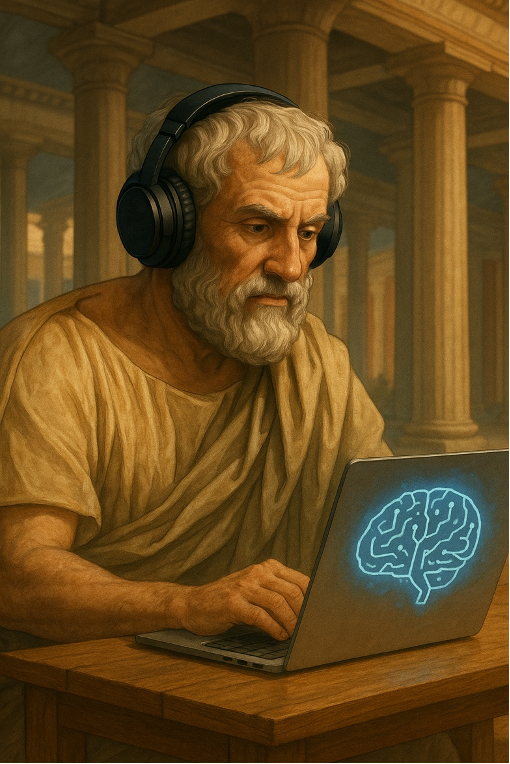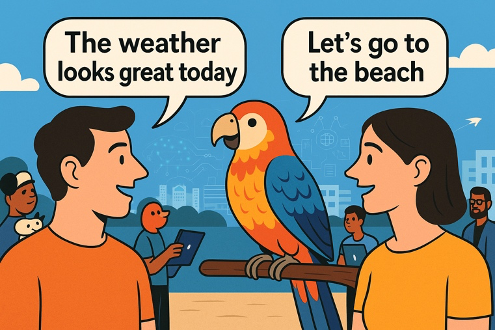If Aristotle Had Access to Artificial Intelligence
If you dropped Aristotle into 2025 and gave him a laptop with AI, he would absolutely love it but will ask “who is in charge of labeling the training data?” and see the risk of moral deskilling.
It is evidently impossible to run the experiment, but more likely than not Aristotle would have loved AI. He would have seen it as a strange, powerful new techne (tool). That is, a new craft begging to be dissected, classified, and fitted into a bigger picture of what it means to live. Let’s time-warp him into our current world and speculate in a way that is grounded in his actual philosophy, what Aristotle would do with AI.
Imagine Aristotle in the Lyceum. Not the ancient Lyceum around 335 BC in Athens, but the hypothetical modern version of today. He is wearing noise-canceling headphones and staring at a chat window. He would most likely not start with “Are you conscious?” He would start with a different question: “What are you?”
Aristotle opens a laptop
First of all, why him? Aristotle was unique among ancient Greek intellectuals due to his pioneering development of a systematic, empirical approach to knowledge. While his teacher Plato often focused on the abstract and ideal, Aristotle emphasized observation, logic, and the study of the physical world as the path to understanding reality. The Aristotelian method always begins with classification. In Ethika Nikomacheia, Aristotle’s best-known work on ethics, he divides knowledge and activities into types. Therefore, he would initially be obsessed with figuring out the category something belongs to. So his first moves with AI would be to try to figure out what it is. Silicon, electricity, etc. He then would have tried to understand what makes AI work. Algorithms, architectures, symbolic rules, neural networks? Then, what drives it. Those would be programmers, data annotators, economic incentives? And finally, he would have need to understand the drivers. What AI is for? Is it to help the lazy, to generate uncommon knowledge, to acquire or consolidate political power, or purely for profit? Only afterwards he would have tried to figure out what can it actually do? May predict words in a sentence? Recognize images in painted pottery? Compose arguments for the Areopagus or the Boule? Or perhaps to drive a chariot? After some interactions, he would quickly realize that AI is no ghost in the machine but an absurdly complicated but immensely knowledgeable and powerful techne. But in his mind that does not yet make AI virtuous. And this distinction, knowledge versus wisdom, is where things get really interesting.
Aristotle meets machine learning
Prior Analytics precedes Python by millennia. This is because Aristotle built and dissected arguments in structures. For example, “All humans are mortal. Socrates is a human. Therefore, Socrates is mortal.” Therefore, if you dropped him into a world of first-order logic and symbolic AI he would feel oddly at home. He would see symbolic AI as an Organon on steroids. He would say “OK, you mechanized the Organon. Nice! Now, show me where it fails.” Aristotle would see machine learning as a tool that extracts patterns from examples, but without understanding. He’d probably describe deep learning as a sort of mindless habit acquired from immense collective experience. Like training a strange but very fast super student to complete your sentences without having any idea what they are talking about.
ML as a parrot with the crystal ball.
Criticism kicks in
Aristotle understood that nonsense can occur if the starting points of an argument are false, so he would look at AI systems and immediately ask, “Who is in charge of the training data? Who chooses the data, labels and objectives, and by what right?” He would see that the premises of machine reasoning are not abstract truths but messy human choices about which examples to include, which labels to apply, and which outcomes to reward. Therefore, he would suggest a multipronged project. First, he would write or commission a treatise on the first principles of machine reasoning, probing not only how models infer patterns but why those patterns came to be privileged over others. Who chooses the data, labels, and objectives, and whose interests do those choices serve? He would worry about hidden power. For example, corporations silently encoding their needs into loss functions to get models to optimize for profit while simultaneously pretending to be neutral. He would also insist on examining feedback loops. In Aristotelian terms, the proximate causes (engineers, product managers, policymakers) and the ultimate causes (the goals they set) must be transparently brought into the open and subjected to public scrutiny and ethical debate. In other words, he would see this as a problem of making AI algorithms do what humans actually want them to do, in a way that promotes practical wisdom for genuine human benefit, rather than merely optimizing a narrow metric.
Aristotle’s De Anima
Aristotle distinguished several intellectual virtues. Episteme is the scientific (academic) knowledge of some truths. Techne is a craft skill or know-how. Phronesis is the practical wisdom of deciding well in concrete situations. Sophia is the philosophical wisdom of grasping the ultimate truths. And Nous, perhaps the trickiest of them all, is the intuitive aspect that allows to see first principles. Aristotle might say AI is just a big fat techne because it is obviously a craft designed to produce certain outputs. However, it is also a tool inside many crafts. For example, medicine, finance, logistics, or urban planning. He would have recognized that AI looks like episteme but it is not, because it can encode lots of scientific knowledge but only in a derivative way. It finds correlations in data but does not know why. He would surely see that AI is absolutely not phronesis because practical wisdom is about living well in the context of a whole life. That implies character, habits, emotions, and a life-narrative, all things that AI does not have. Aristotle’s slogan for AI might be “Great for techne, but dangerous if you mistake it for phronesis.” If we read his “On Sophistical Refutations”, we would know that Aristotle will absolutely have no problem in publicly embarrassing people who say “AI will replace human wisdom.” He will expose the mistakes, name the fallacies and make it clear that such argument cannot belong in science or good politics. Because for Aristotle nous is the power that grasps first principles, that is exactly the one thing that current AI is structurally bad at. Nous is what sees the basic starting points, not just the patterns. It is a kind of intellectual click that makes reality meaningful. AI algorithms do not get to choose or justify their own first principles. They just inherit data, objectives and loss functions. They can extrapolate and recombine patterns inside that frame, but they do not step outside the frame to question the goals. AI makes no commitments to virtue, and he will see a big danger in moral deskilling.
At some point he will find someone telling him that people are arguing whether AI has consciousness. A very skeptical eyebrow will rise. In De Anima, Aristotle defines the soul (psyche) as a form that makes a body be alive, able to grow, sense and think. Plants have a nutritive and sensory soul, whereas animals have nutritive, sensory and locomotive soul. Humans, however, have all of that plus a rational soul. From that standpoint, Aristotle would say that AI has no body or soul. It has no life-activity, but it has a “quasi-form” that is structured and can perform some functions. This makes it philosophically interesting. In short, Aristotle would probably say “Let’s not confuse impressive language with actual life.”
Aristotle and AI
If Aristotle had a Substack, his post may be entitled “AI and the Good Life”, and his closing argument will be “use AI to support virtue, never to replace it.” If Aristotle had a job, it would most likely be a highly paid “philosophical prompt engineer” sitting in a co-working space called The Lyceum Hub. He will make sure that AI algorithms learn that they are assistants trained to think like a virtuous Athenian citizen, and that for each answer they explained how it affects courage, justice, and friendship.


